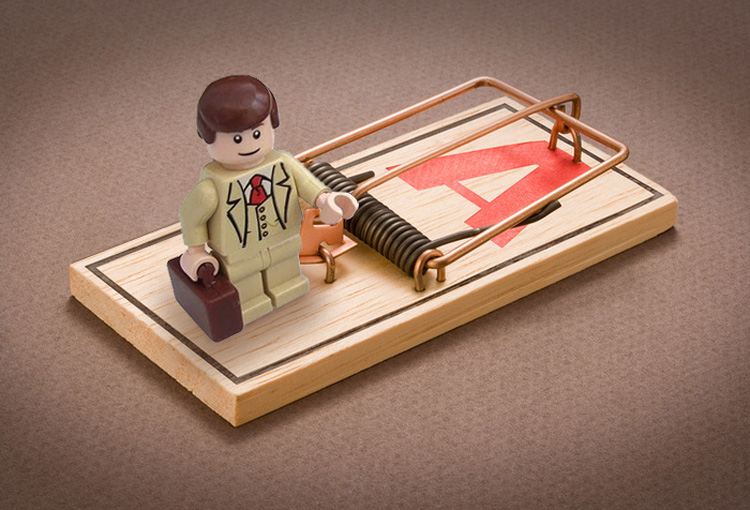The Great Self-employment Trap – part 1
Work your own hours they said. Make more money they said. Be your own boss they said. Sit back and relax… no they didn’t say that. It’s a lonely road, filled with guilt, obstacles, self-doubt, and confusion.

Much of the problem with being self-employed boils down to what you learn after you start. However, let’s first re-define self-employment as freelancing, also not to be confused with being in your own business, as tempting as it is to stretch the idea. Freelancing is trading your work hours for money, much like employment, except you don’t have a fixed schedule, or at least, not for very long periods.
Freelancing as a telecoms specialist might mean that you work 9-to-5 for a time, only because the business you work for won’t hire someone else specifically to supervise you outside of their regular business hours. More often than not, the business will have someone who stays late from maintenance, or even a security guard that can be your key to access. Businesses like as little interruption as possible, and any infrastructure repairs (or upgrades) that might affect their business process, is best done after hours, or if possible, on weekends.
Freelancing as a designer, whether it’s web design or fashion, will likely require working at all hours of the day, which may be the ideal job for anyone with insomnia. You’ll soon realize that you need to be creative with your time. Start thinking about gaps in your schedule as opportunities to be productive, rather than opportunities to fart around on facebook, as most office workers would.
Employees don’t know the level of self-discipline required to freelance successfully. In their world, work is spoon fed to them like a baby in a high chair. When an employee has a lapse in concentration, some other employee is tasked with verbally slapping them awake. The whole mindset of an employee is closer to the mind of a fish than a primate; when an employee sees a threat to their sedentary existence, they swim to the middle of their group in the hopes of not getting singled out.
Freelance work provides more freedom than a traditional job, but make no mistake, it’s still a job. If you plan to relax, you’ll only fail.
You will still need to eat, do errands, pickup kids, to laundry, or any other number of activities that steal you away from your job, and they will all seem important. Being at home could be your worst enemy. How you decide what’s most important, at any given moment, could be the deciding factor in your success. Can you kick your own ass?
When you are interrupted by a dog, or a child, even your own child, who wants to play, dispatch them quickly, children are easier in this regard, you can send them outside, or start them on a new activity. The key is not to put them first, unless there’s screaming or blood, it’s probably ok. Your emotions are not a good metric to decide a course of action, you need logic, and perspective to do that. They will play on your feelings of guilt, yes they will.
If your best friend calls you up, asks if you want to hang out, and they get upset when you bring your business phone along, it’s because they don’t understand. If that phone rings, that’s your job, you made a choice, you traded away your regular schedule, this is the price you pay. You need to be very clear with yourself, no matter how many eyes are rolled at you, no matter how often you are made to feel guilty, you’re on the clock, they aren’t. Your friends aren’t going to be different, they aren’t above all that.
If this seems jarringly offensive, you are not ready to be self-employed. You just aren’t.
If you are going to be the specialist, you will have to become comfortable telling other people what to do. Some people find this thought horrifying. If you are a tradesman, such as a carpenter, an accountant, or a photographer, someone will always question your judgment, and someone will always question your skillset. This is normal. People always try to tear down their peers to elevate themselves. Your resolve must hold.
This is why so many professions are licensed, like attorneys, or encouraged to hold licenses, like financial planners. There has to be an air gap between the specialist, and the laymen. Often, this paper distinction is enough to deter interrogation, or worse yet, accusations. The magician is under no obligation to reveal his secrets, why are you? This is your test as a professional, as the boss of your company of one, not as their peer.
Eventually we all encounter a situation where someone we know, or someone we respect disagrees with our professional assessment, they might even start an argument about it. This is the insidious one, your emotions will get in the way of your rationale, your memory of your previous relationships, and roles within them will come flooding back. They will make you nervous, and quite possibly feel like a kid being scolded by a parent, for doing something stupid.
It’s a test you will have to pass, and pass again, and again, until you grow an impervious skin.
As you can see, the transition from employee to self-employed can be a challenge. There are hazards to deal with, boat anchors that will slow you down, and the constant nagging sense that you’re the crazy one. You will feel alone, and all the challenges will feel unique to you. If you are prone to being discouraged, you might become seriously depressed.
But, you are not alone, and you are not unique. Business is business, and you’re just one of many. Don’t be afraid to reach out for help, but make sure you reach up, to successful people, people with business experience. What you can’t do is reach out to your employee friends, and they most likely won’t understand why.
In Part 2 of this article, we’ll discuss how to prepare, plan, and execute every job, so that you don’t go insane.
Leave A Comment
You must be logged in to post a comment.

